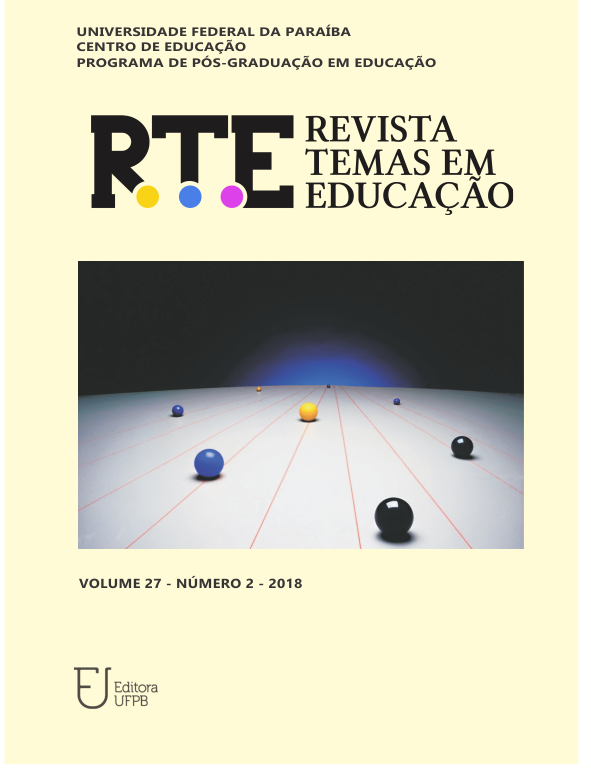ENSEÑANZA Y FORMACIÓN DE LITERATURA DE PROFESORES Y LECTORES
LITERATURE TEACHING AND TRAINING OF TEACHERS AND READERS
DOI:
https://doi.org/10.22478/ufpb.2359-7003.2018v27n2.39958Palabras clave:
Formación inicial., Enseñanza de Literatura., Metodología de Enseñanza de Literatura., Lector literario.Resumen
Este artículo constituye una comunicación de investigación en curso, que tiene como objetivos, en un aspecto general, investigar la formación del estudiante del curso de Letras, modalidad a distancia, del IFPB, para la enseñanza de literatura en la Enseñanza Fundamental II y Media. Dicho estudio, trabaja a partir del contenido teórico-metodológico que se utiliza en la asignatura de Metodología de la Enseñanza de Literatura. Además de esto, en un plano específico, verificar las contribuciones de ese materialpara la formación inicial docente en Letras, a lo que se refiere a la enseñanza del poema en la Enseñanza Fundamental. Para entender mejor este tema, utilizamos como fundamentación teórica conceptos discutidos por especialistas del área como Lajolo (2008), Zilberman (2003) y Pinheiro (2000). Para el desarrollo de este estudio, elegimos la investigación bibliográfica de cuño cualitativo-interpretativo, la cual es capaz de atender los objetivos propuestos, teniendo en cuenta que ésta es una investigación quecircula en torno a la práctica docente con la finalidad de reflejarla e intervenir para perfeccionarla. Los resultados iniciales revelan que el contenido teórico que basa la clase que tiene como objetivo tratar del género lírico en la clase de Metodologíade la Enseñanza de literatura se encuentra adecuado al abordaje metodológico de dicho género literario, si se lleva en cuenta los lectores en formación.
Descargas
Citas
AGUIAR, Vera Teixeira de; BORDINI, Maria da Glória. Literatura - a formação do leitor: alternativas metodológicas. 2. ed. Porto Alegre: Mercado Aberto, 1993.
BRASIL. Lei Nº. 11.892, 27 de novembro de 2008. Institui a Rede Federal de Educação Profissional, Científica e Tecnológica, cria os Institutos Federais de Educação, Ciência e Tecnologia. Brasília, DF, 2008. Disponível em: <http://www.planalto.gov.br/ccivil_03/_Ato2007-2010/2008/Lei/L11892.htm>. Acesso em: 2 fev. 2018.
_____. INEP. PISA - Programa Internacional de Avaliação de Estudantes. 2015. Disponível em: <http://portal.inep.gov.br/web/guest/pisa>. Acesso em: 30 jan. 2018.
COUTINHO, Afrânio (Dir.). A literatura no Brasil: introdução geral. 4. ed., rev. e ampl. São Paulo: Global, 1997, v. 1.
DIONÍSIO, Maria de Lourdes. Literatura, Leitura e Escola. Uma hipótese de trabalho para a construção do leitor cosmopolita. In: PAIVA, Aparecida et. al. (orgs.). Leituras literárias: discursos transitivos. Belo Horizonte, Ceale, Autêntica, 2005.
EAGLETON, Terry. Teoria da Literatura: uma introdução. Trad. Waltensir Dutra, 5ª Ed. São Paulo, Martins Fontes, 2003.
FAILLA, Zoara (org.). Retratos da leitura no Brasil 4. Rio de Janeiro: Sextante, 2016.
FORMIGA, Girlene Marques. et. al. Introdução aos Estudos Literários. João Pessoa: Ed. IFPB, 2014.
INSTITUTO FEDERAL DA PARAÍBA. Projeto Pedagógico do Curso de Licenciatura em Letras na modalidade a distância. João Pessoa, 2017. Disponível em: < https://estudante.ifpb.edu.br/media/cursos/43/documentos/Projeto_Pedag%C3%B3gico_do_Curso_de_Licenciatura_em_Letras_2017.pdf>. Acesso em: 24 fev. 2018.
LAJOLO, Marisa. Do mundo da leitura para a leitura do mundo. 6 ed. São Paulo: Editora Ática, 2008.
INSTITUTO NACIONAL DE ESTUDOS E PESQUISAS EDUCACIONAIS ANÍSIO TEIXEIRA LEGISLAÇÃO E DOCUMENTOS - INEP. Pisa 2018: para que serve. Brasília: INEP, 2018. Disponível em: < http://portal.inep.gov.br/pisa>. Acesso em: 02 mai. 2018.
LUDWING, Antonio C. Will. Métodos de Pesquisa de Educação. Educação em Revista, Marília, v.14, n.2, p.7-32, Jul.-Dez., 2014.
OECD. Programme for Internacional Sdutend Assessment (PISA). Results from PISA 2015. Disponível em https://www.oecd.org/pisa/PISA-2015-Brazil-PRT.pdf. Acesso em: 24 fev. 2018.
PÉCORA, Alcir. Máquina de Gêneros. São Paulo: Edusp, 2001.
PIMENTA, Selma Garrido; LIMA, Maria S. Lucena. Estágio e Docência – Teoria e Prática: Diferentes Concepções. In BRABO, Tânia S. A. Marcelino; CORDEIRO, Ana Paula; MILANEZ, Simone G. Costa (orgs.). Formação da pedagoga e do pedagogo: pressupostos e perspectivas. Marília: Oficina Universitária; São Paulo: Cultura Acadêmica, 2012.
PINHEIRO, Helder. Poemas para crianças e jovens. In: PINHEIRO, H. (org.). Poemas para crianças: reflexões, experiências, sugestões. São Paulo: Duas Cidades, 2000.
ROUXEL, Annie. Aspectos metodológicos do ensino de literatura. In: DALVI, Maria Amélia et. al. (orgs.). Leitura de Literatura na Escola. São Paulo: Parábola, 2013a.
_____. A tensão entre utilizar e interpretar na recepção de obras literárias em sala de aula: reflexão sobre uma inversão de valores ao longo da escolaridade. In: ROUXEL, Annie; LANGLADE, Gérard; REZENDE, Neide Luzia (org.). Leitura subjetiva e ensino de literatura. São Paulo: Alameda, 2013b, p. 152-164.
TODOROV, Tzvetan. A Literatura em Perigo. Trad. Caio Meira. Rio de Janeiro: Difel, 2009.
______. Literatura não é Teoria, é Paixão. Revista Bravo. 2010. Disponível em:<http://bravonline.abril.com.br/materia/tzvetan-todorov-literatura-nao-teoria-paixao>. Acesso em: 5 mar. 2018.
ZILBERMAN, Regina. Letramento Literário e Livro Didático, uma Difusão da Literatura pela Escola. In: PAIVA, Aparecida; MARTINS et. al. (orgs.). Literatura e Letramento: Espaços, Suportes e Interfaces – O Jogo do Livro. Belo Horizonte: Ceale; Autêntica, 2003.
Descargas
Publicado
Cómo citar
Número
Sección
Licencia
Los autores que publican en esta revista aceptan los siguientes términos:
. Los autores conservan los derechos de autor y otorgan a la revista el derecho a la primera publicación, con el trabajo licenciado simultáneamente bajo la Licença Creative Commons Attribution que permite compartir el trabajo con reconocimiento de autoría y publicación inicial en esta revista.
. Se autoriza a los autores a asumir contratos adicionales por separado, para la distribución no exclusiva de la versión del trabajo publicado en esta revista (p. Ej., Publicación en repositorio institucional o como capítulo de libro), con reconocimiento de autoría y publicación inicial en esta revista.
. Se permite y se anima a los autores a publicar y distribuir su trabajo en línea (por ejemplo, en repositorios institucionales o en su página personal) en cualquier momento antes o durante el proceso editorial, ya que esto puede generar cambios productivos, así como aumentar el impacto y cita del trabajo publicado (Ver O Efeito do Acesso Livre).



















